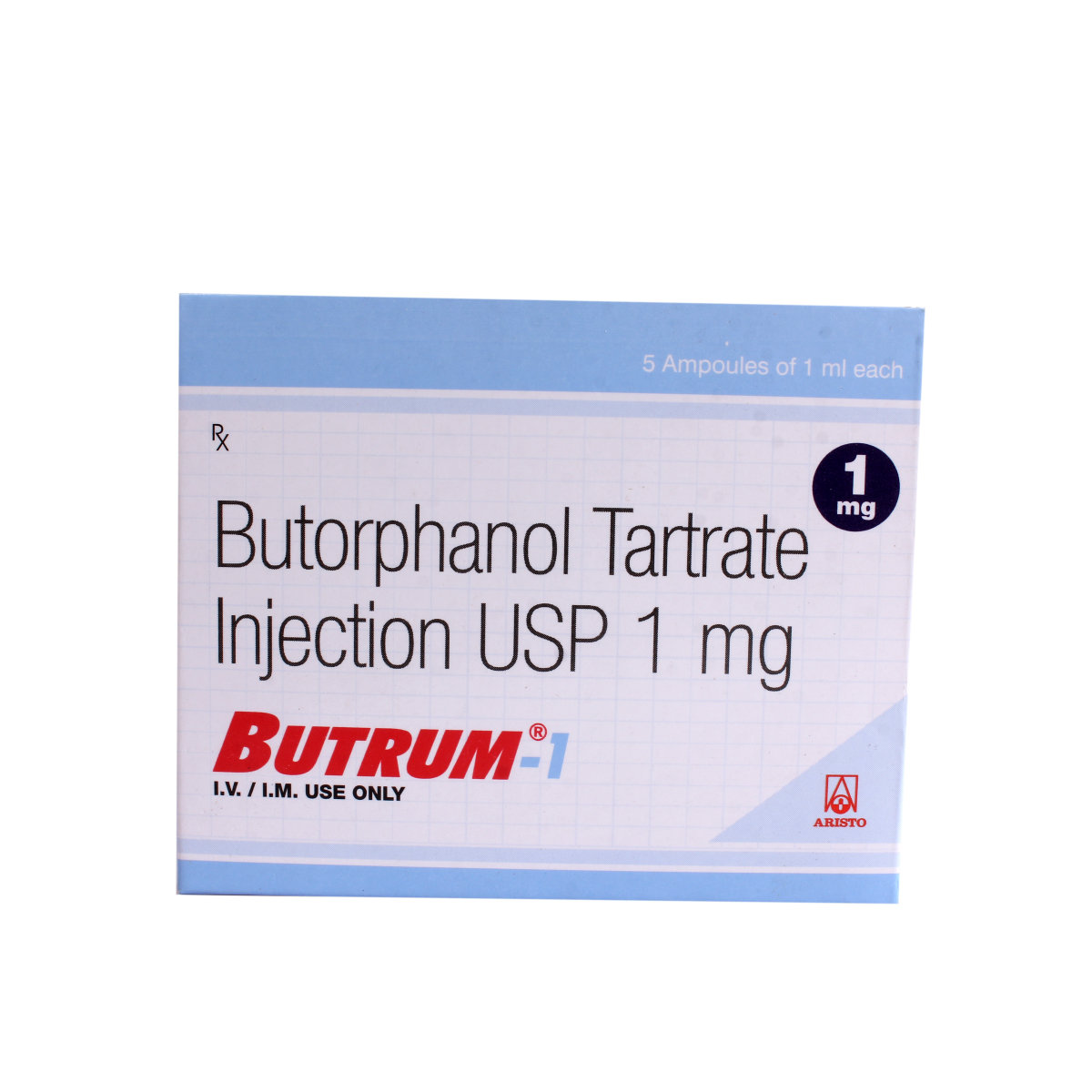Butorphanol
About Butorphanol
Butorphanol belongs to the class of 'narcotic analgesics' primarily used to treat moderate to severe pain post-surgery, muscle pain, and migraine-related headaches. Butorphanol is also used as an anaesthesia adjunct during surgery and early labor. Pain is a symptom triggered by the nervous system, which causes uncomfortable sensations in the body.
Butorphanol contains 'Butorphanol' which works by blocking the transmission of pain signals located in the brain that controls pain, pleasure, and addictive behaviors. Butorphanol also acts as a pre-anaesthetic during surgery, antitussive (cough suppressant), and antiemetic (prevents vomiting) medication.
Use this medicine as prescribed by your doctor. Your doctor will decide the dose and duration based on the severity of your pain and response to treatment. Common side effects of Butorphanol include headache, dizziness, sleepiness, vomiting, nausea, and constipation. These side effects are not familiar to everyone and vary individually. If you notice any side effects that are not manageable, please consult your doctor.
Inform your doctor beforehand if you have liver, kidney, or heart diseases, breathing problems, mood disorders, brain-related problems, gastrointestinal disorders, underactive thyroid (hypothyroidism), drug addiction, and urination problems before starting Butorphanol. It is essential to let your doctor know if you are pregnant, planning to conceive, or a breastfeeding mother. Butorphanol causes dizziness and drowsiness, so do not drive or operate machinery until you are mentally alert. Avoid alcohol to further prevent the worsening of side effects. Butorphanol is not recommended for people below 18 years of age.
Uses of Butorphanol
Medicinal Benefits
Butorphanol contains 'Butorphanol', an opioid analgesic that helps relieve moderate to severe pain post-surgery, muscle pain and migraine headaches. Butorphanol is also used as a part of anaesthesia during surgery and early labor. It helps relieve pain in various conditions like toothache, rheumatoid arthritis, and osteoarthritis. It works by acting on the opioid receptors and blocking the transmission of pain signals.
Directions for Use
- Follow your doctor's instructions on the dosage and timing of this medication.
- Butorphanol will be administered by the doctor or nurse in a healthcare setting.
- Do not self-administer.
Storage
Side Effects of Butorphanol
- Constipation
- Nausea
- Vomiting
- Dizziness
- Drowsiness
- Headache
Drug Warnings
Inform your doctor if you have a history of liver, kidney or heart diseases, abdominal problems (gallbladder disease, pancreatitis), adrenal gland diseases (Addison's disease), brain disorders (fits, tumours, increased intracranial pressure), heart problems (irregular heartbeat, chest pain, a recent history of heart attack), high blood pressure and breathing problems (asthma, chronic obstructive pulmonary disease-COPD, sleep apnoea) before starting Butorphanol. If you have any mood disorders (toxic psychosis), spine problems (kyphoscoliosis), gastrointestinal problems (diarrhoea, paralytic ileus), personal or a family history of a substance use disorder like overuse of or addiction to drugs or alcohol, urination problems (enlarged prostate or urethral stricture) and an underactive thyroid (hypothyroidism), inform your doctor in advance before starting Butorphanol. Please consult your doctor if you are pregnant, planning to conceive or a breastfeeding mother. Butorphanol causes dizziness and drowsiness, so do not drive until you are mentally alert. Avoid alcohol to prevent the worsening of side effects further. Butorphanol is not recommended for anyone below 18 years of age.
Drug Interactions
Drug-Drug Interaction: Butorphanol may interact with nasal decongestants (oxymetazoline), opioid pain relievers (codeine, hydrocodone), anti-anxiety drugs (alprazolam), muscle relaxants (cyclobenzaprine), anti-allergic drugs (cetirizine), common cold medicines (diphenhydramine), antifungals (ketoconazole), antibiotics (erythromycin), HIV/AIDS drugs (ritonavir), fits medicines (clonazepam, phenytoin), pigments (methylene blue), chemotherapy medicines (procarbazine), anti-depressants (phenelzine, selegiline), drugs treating Parkinson's disease (rasagiline) and medicines for alcohol dependence (naltrexone).
Drug-Food Interaction: No interactions were found/established.
Drug-Disease Interaction: Before using Butorphanol, let your doctor know if you have any liver, kidney or heart diseases, breathing problems, mood disorders, brain-related problems, gastrointestinal disorders, underactive thyroid (hypothyroidism), drug addiction/substance use, and urination problems.
Drug-Drug Interactions Checker List:
Safety Advice

Alcohol
unsafeYou are recommended to avoid alcohol consumption while taking Butorphanol. Alcohol intake, along with Butorphanol, may cause increased drowsiness and dizziness.

Pregnancy
cautionPlease consult your doctor before taking Butorphanol if you are pregnant or planning to conceive.

Breast Feeding
cautionButorphanol is excreted into the breast milk. Please consult your doctor before taking Butorphanol if you are a nursing mother.

Driving
unsafeButorphanol may make you feel dizzy and drowsy. Do not drive or operate machinery if you experience these side effects.

Liver
cautionPlease consult your doctor since Butorphanol should be used with caution in patients with liver impairment/liver disease.

Kidney
cautionPlease consult your doctor since Butorphanol should be used with caution in patients with kidney impairment/kidney disease.

Children
unsafeButorphanol is not recommended in anyone below 18 years of age.
Habit Forming
Diet & Lifestyle Advise
- Physical activity helps in strengthening muscles and relieves joint stiffness. Gentle exercises like 20-30minutes of walking or swimming would be helpful.
- Performing yoga may also help in improving joint flexibility and pain management.
- Maintain a healthy weight by performing regular low-strain exercises and eating healthy food.
- Get adequate sleep as resting the muscles can help in reducing inflammation and swelling.
- Follow heat or cold therapy, apply a cold or hot compress on the joints for 15-20minutes regularly.
- De-stress yourself by meditating, reading books, taking a warm bubble bath or listen to soothing music.
- Acupuncture, massage and physical therapy may also be helpful.
- Eat food rich in antioxidants such as berries, spinach, kidney beans, dark chocolate, etc.
- Foods containing flavonoids help in reducing inflammation. These include soy, berries, broccoli, grapes and green tea.
- Avoid smoking and alcohol consumption.
Special Advise
- Let your doctor know that you are taking Butorphanol if you are undergoing any medical tests.
- Monitor your blood pressure regularly since Butorphanol may affect your blood pressure.
- Butorphanol may interfere with lab tests of amylase and lipase, hence inform your laboratory staff in advance that you are taking Butorphanol.
Patients Concern
Disease/Condition Glossary
Pain: It is not a disease but a symptom triggered by the nervous system, causing uncomfortable sensations in the body. Pain may be dull or sharp, it might be constant or may come and go. The tolerance level of pain might vary from person to person. Pain can be generalized (overall body aches) or localized (affecting a specific area of the body). Pain can be considered a good thing as it helps us know that something is wrong in the body and thereby helps diagnose the condition. The common causes of pain include headache, muscle strain, cramps, cuts, bone fractures, arthritis and stomach ache.
FAQs
Butorphanol is used to treat moderate to severe pain post-surgery, muscle pain, and migraine-related headaches. It is also used as an anaesthesia adjunct during surgery and early labour.
Butorphanol contains 'Butorphanol', an opioid pain reliever that blocks the transmission of pain signals by acting on specific centres of the brain. Thus Butorphanol reduces pain associated with various conditions like surgery pain, muscle pain, migraine headaches, arthritis pain and toothache.
Butorphanol may cause your blood pressure to drop upon administration of nasal spray. This may lead to fainting, light-headedness and dizziness after its use in the first hour. To prevent this from happening, remain sitting or lying down after using Butorphanol.
It is not recommended to suddenly stop taking Butorphanol since it may produce withdrawal symptoms, especially when you used Butorphanol for a longer time or in high doses. Please seek medical advice on how to stop taking Butorphanol safely. Your doctor may lower your dose slowly to prevent withdrawal symptoms.
Butorphanol can cause side effects like dizziness and drowsiness, hence it is advised to remain sitting or lying after taking Butorphanol. You are also advised not to drive or operate machinery until you are mentally alert.
Butorphanol may sometimes cause addiction despite its medical benefits. The risk of habit-forming or addiction is higher in people with a history of substance use disorder like overuse of drugs and alcohol. It is strictly recommended to use Butorphanol in the dose and duration prescribed by your doctor. Do not double the dose.
If you have liver or kidney issues, you should use Butorphanol with caution as it is primarily excreted through the kidneys, and its use may pose a higher risk of side effects in patients with impaired kidney function. Butorphanol is also extensively metabolized in the liver. Always consult your doctor before using Butorphanol if you have liver or kidney problems.
If you suddenly stop using Butorphanol, you may experience withdrawal symptoms such as nausea, vomiting, fatigue, dizziness, drowsiness, irritability, insomnia or runny nose. It is important to consult your doctor before discontinuing Butorphanol, as they can provide guidance on safely minimizing withdrawal effects.
While on therapy with Butorphanol, be cautious if you experience drowsiness and dizziness, or if you have breathing problems, and avoid driving or operating heavy machinery. Be aware of the potential for dependence or withdrawal symptoms with prolonged use of Butorphanol. Inform your doctor if you have a history of liver, kidney or heart diseases, abdominal problems (gallbladder disease, pancreatitis), adrenal gland diseases (Addison's disease), brain disorders (fits, tumours, increased intracranial pressure), heart problems (irregular heartbeat, chest pain, a recent history of heart attack), high blood pressure and breathing problems (asthma, chronic obstructive pulmonary disease-COPD, sleep apnoea) before starting Butorphanol.
Butorphanol causes side effects such as constipation, nausea, vomiting, dizziness, drowsiness, and headache. These do not require any medical attention as they will gradually reduce over time. Please, contact a doctor if these persist longer




